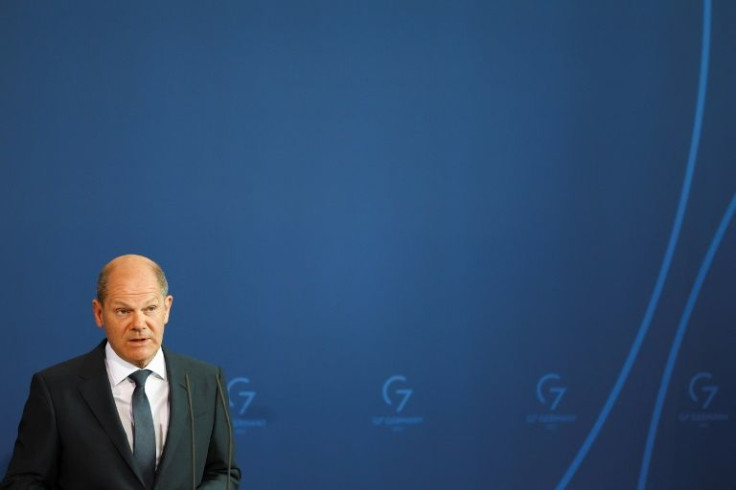Taciturn Scholz Under Fire For Hesitant Ukraine Stance
German Chancellor Olaf Scholz was under growing pressure on Wednesday over his perceived lack of leadership over the war in Ukraine and his dogged refusal to send heavy weapons to the country.
Almost two months after he responded to Russia's invasion of Ukraine by promising a "turning point" in German defence policy, critics say the chancellor has failed to take enough concrete action.
Scholz has sent defensive weapons to Ukraine and announced extra military aid in recent weeks but has so far not agreed to directly send heavy weapons -- leaving Germany increasingly out of step with European and NATO allies.
"We believe that the Bundeswehr (German army) would be capable of supplying us with the weapons we need right now," Ukraine's ambassador to Germany, Andriy Melnyk, told the ZDF broadcaster on Wednesday. "We do not know why this is not happening."
Army general Markus Laubenthal said the Bundeswehr was simply not in a position to send the weapons Ukraine wants, as this would "considerably weaken (Germany's own) defence capability".
The chancellor also said in a speech on Tuesday evening that Germany does not want to "go it alone" and send heavy weapons without the backing of its allies.
But with the United States, Canada, Britain, the Netherlands and others all stepping up their deliveries in recent days, Die Welt newspaper said "the German government's position is increasingly a case of going it alone" in the other direction.
And the Bild daily reported on Wednesday that the government had deliberately withdrawn armoured vehicles and tanks from a list of equipment German arms manufacturers were offering to make available to Ukraine at the end of March -- slashing the inventory from 48 to 24 pages.
"Germany's reputation is being damaged" and "valuable time is being lost", opposition leader Friedrich Merz told the WDR broadcaster.
"There are NATO partners who are well ahead of Germany" and "already delivering heavy weapons to Ukraine", Merz said, leaving people at home and abroad asking: "What is Germany doing?"
Scholz has also faced criticism from within his own coalition government, a partnership between his Social Democrats (SPD), the Green party and the liberal FDP.

Anton Hofreiter from the Greens accused him of failing "to show enough leadership", while Marie-Agnes Strack-Zimmermann of the FDP called on him to finally "take the baton in his hand and set the rhythm".
Since Russia's invasion of Ukraine, several members of Scholz's SPD have come under fire over the party's close historic ties with Moscow, including President Frank-Walter Steinmeier and former chancellor Gerhard Schroeder.
The Handelsblatt daily said the SPD was under "increasing pressure" over the war and in danger of creating the impression it "has not broken with its Russia policy of past years".
Famous for his calm stoicism and taciturn demeanour, Scholz won last September's election in Germany with a campaign that played on his reputation as a safe pair of hands.
But his strategy of being "calmness personified" may finally have reached its limits, the Sueddeutsche Zeitung suggested on Tuesday.
"Either Scholz will deliver an answer to Germany's 'turning point' and Russia's crimes in Ukraine with his trademark stoicism, or his stoic calmness will see him fail horribly," it said.
Many Germans agree, according to a recent survey for Der Spiegel magazine. Asked whether they saw Scholz as a strong leader, 65 percent of respondents replied with either "not especially" or "not at all".
"The German chancellor is never the first and often even the last when it comes to responding in this war," Der Spiegel said, pointing to Scholz's hesitancy on cutting Russia off from the SWIFT banking payments system as well as his reluctance to ban Russian gas.
"If the course of the past few months has shown one thing, it's that Scholz doesn't make decisions until he has no other choice," it said.
Catherine de Vries, a Dutch professor of political science at Bocconi University, said Scholz was continuing the legacy of former chancellor Angela Merkel by offering the "smallest possible concessions at the last possible moment".
This approach was perhaps understandable from a domestic point of view, she wrote on Twitter, but "destructive for Europe".
© Copyright AFP 2024. All rights reserved.




















